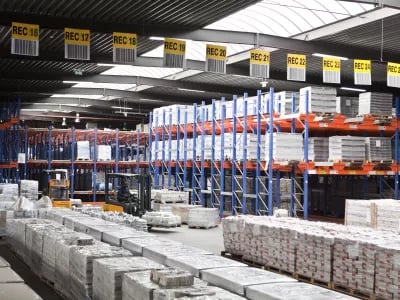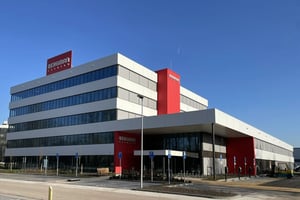BD myShopi recently signed the Green Deal for Sustainable Urban Logistics, a joint initiative by the Flemish government and 34 urban logistics businesses and organisations. In signing up to that initiative, this specialist in both online and offline consumer activities and specialised logistics clearly demonstrated its belief that the future lies in efficient, sustainable distribution in urban areas. More than 200 businesses have already joined the initiative’s Dutch counterpart, the Green Deal for Zero-Emission Urban Logistics (Zero Emissie Stadslogistiek, ZES).
BD myShopi, an NPM Capital portfolio company, has one of Belgium’s largest last-mile delivery networks, one that delivers leaflets to around 4.5 million households every week on behalf of practically all the big retail names. The company also uses the myShopi online promotional platform – which boasts over 2 million downloads to date – to communicate with consumers digitally.
According to Raf Lambrix, BD myShopi CEO, his company has a clear sustainability strategy in place. The effects of that strategy can be seen in the recent acquisition of CityDepot from Belgian postal service provider bpost. CityDepot works with transporters and logistics companies to combine deliveries to businesses and traders. “We are seeing an increasing demand for specialised and sustainable residential and business logistics”, says Lambrix. “The keyword is ‘proximity’, and that proximity has been at the core of BD myShopi for decades. The acquisition of CityDepot allows us to expand our expertise and solutions even further, to combine even more deliveries so we can limit the number of movements. This will meet the demand for sustainable logistics that we are hearing from all our stakeholders.” Another recent acquisition by BD myShopi is Dockx Select, which specialises in the last-mile delivery of oversized items. This acquisition aligns perfectly with the course BD myShopi has set for the coming years.
In signing the Green Deal, BD myShopi is aiming not only to reduce the number of kilometres driven, but also to shift the kilometres that are necessary to more efficient time slots and to switch to more environmentally friendly vehicles – or even zero-emission vehicles. “Wherever possible, a vehicle that enters the city full should also leave the city full,” Lambrix states. “We achieve this by offering user-friendly last-mile solutions, involving electric cargo bikes and CNG vans, to deliver items such as e-commerce purchases and B2B orders.”
Tackling obstacles
The Flemish Environment Minister introduced Green Deals as an initiative to make businesses and other sectors ‘greener’. The Green Deal for Sustainable Urban Logistics is the seventh Green Deal in Flanders. Under the deal, private-sector partners and the Flemish authorities make voluntary agreements to work together on the development of a sustainable objective. Businesses and organisations can submit their own proposals for a deal, and the authorities are committed to tackling any obstacles that could get in the way of increasing sustainability. That commitment includes reducing the number of kilometres driven, transferring the remaining kilometres to more environmentally friendly vehicles or time slot, and ‘greening’ those necessary kilometres through the use of zero-emission vehicles.
The Netherlands has its own partnership between municipalities, industry associations and entrepreneurs to make urban logistics more sustainable, and those partners have set themselves a high bar: the Green Deal ZES aims to reduce logistical CO2 emissions in up to 40 city centres – including Amsterdam and Rotterdam – to zero. “We can do it. Zero-emission urban logistics is not rocket science, and it’s definitely not science fiction”, says Gert-Jan Prummel from Green Deal ZES. He is convinced, not least thanks to the large number of organisations that have joined the initiative, that by 2025 logistics in the participating cities “will no longer produce any exhaust emissions”.
Living Labs
The Green Deal ZES is currently facilitating 17 Dutch locations to act as testing grounds: the ‘Living Labs’. These labs are a joint effort by multiple different participants, such as carriers, fuel suppliers, vehicle manufacturers, knowledge institutions and local authorities. Their main focus is on providing insights into which initiatives have the most promise and the broadest potential applications. As Prummel explains: “It’s not just about replacing diesel vehicles with electric ones – there are other smart solutions, too. You can check whether your old logistical principles still apply: Do the same number of lorries still need to drive into the city? Will each entrepreneur act separately? You could have hubs where goods are transferred to alternative transport methods, for example, or boxes where consumers can collect their parcels. There are many more solutions, and we cannot and should not simply introduce them all from the top down.”
The vanguard
Green Deal ZES does not provide any subsidies, instead promoting the reduction of CO2 emissions through collaboration between the various parties. There is however a grant scheme available through the Climate Agreement for businesses that replace their diesel-powered vans and lorries with electric alternatives, with the national government contributing 40% of the additional cost.
Although companies have many different reasons for participating in the initiative, Prummel is keen to emphasise the clear advantages of joining the Green Deal ZES: “Those businesses are in the vanguard; they are sharing knowledge and building new connections. Not to mention that sustainable businesses have a better chance of getting work. Local authorities, provinces and the national government are increasingly focusing on sustainability when they make procurement decisions. And by 2050, diesel and petrol vehicles will no longer be allowed into cities anyway.”
Prummel cites Amsterdam as a good example of a pioneering municipality. The Dutch capital agreed as far back as 2015 that all the municipality’s internal and external relocations would be zero-emission, and the authorities signed a contract to that end with four removal firms. “When government takes on that role”, says Prummel, “the initiative becomes an interesting investment opportunity for entrepreneurs.”
Green commitments
The Green Deal for Zero-Emission Urban Logistics is just one of more than 400 environmental agreements between the national government and partners such as businesses. The energy sector has signed the most deals (134), followed by biobased economy (66) and natural resources (62). There are currently 35 agreements in place in the field of mobility. In addition to emission-free logistics in city centres, those agreements also cover aspects such as sustainability deals for shipping, ports and inland navigation, aviation, a charging network for electric vehicles and car parts. The government aims to use these measures to reduce greenhouse gas emissions and give renewable energy a boost.
Also read ‘BD myShopi signs up to Green Deal for Sustainable Urban Logistics’
Also read ‘BD myShopi acquires CityDepot from bpost’
Also read ‘BD myShopi expands specialist logistics services with the acquisition of Dockx Select’



.jpg?width=448&height=200&name=cybersecurity-privacy-protect-data%20(1).jpg)









